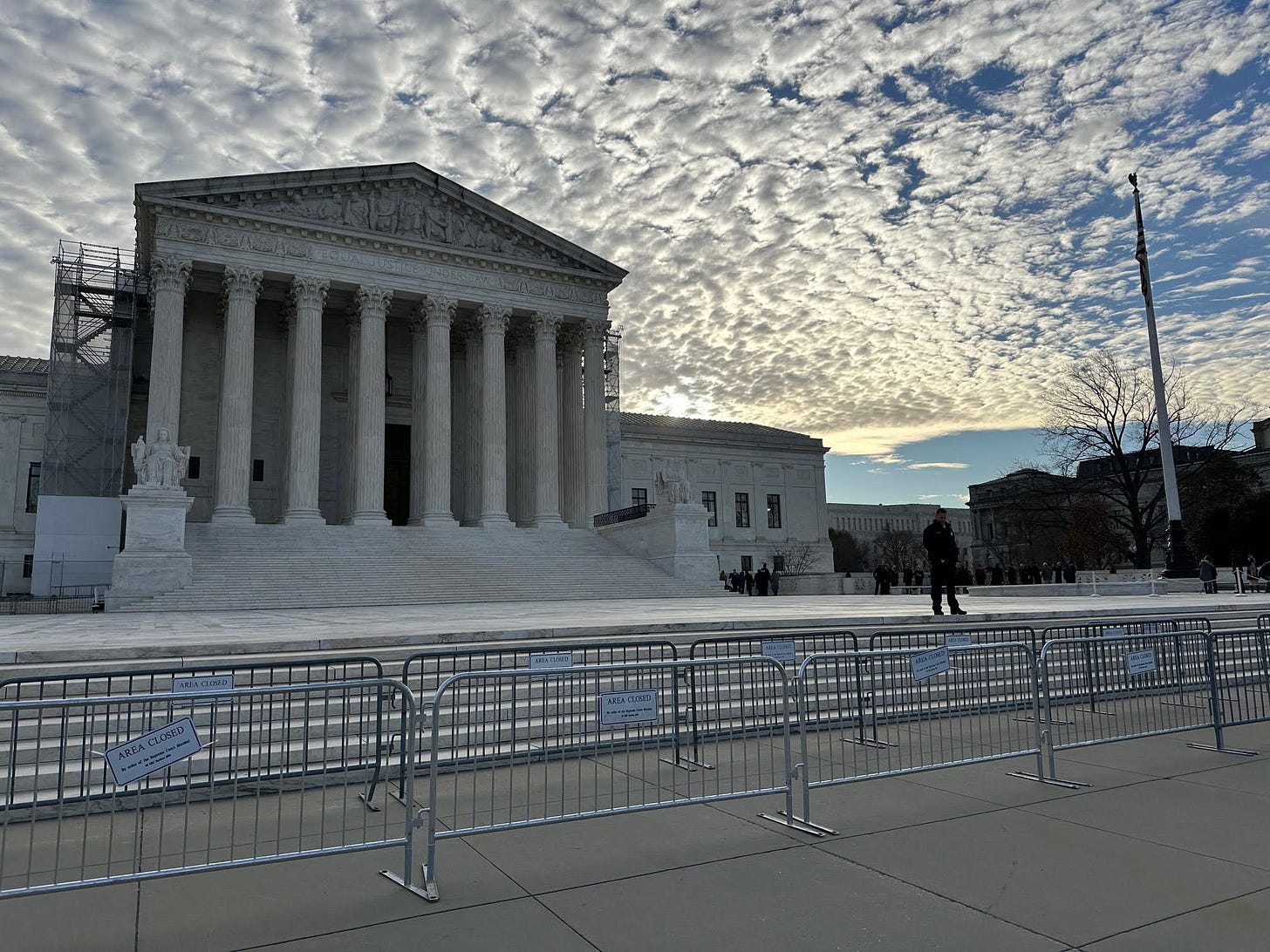The Supreme Court must fully resolve Trump disqualification case now to avert "chaos"
If the justices dodge full resolution of the Section 3 questions now, they've been warned the issue could “come back with a vengeance” on January 6, 2025.
Toward the end of Jason Murray’s time at the U.S. Supreme Court podium on Thursday arguing to an increasingly unreceptive bench that Colorado’s Supreme Court was right to kick Donald Trump off the ballot, Murray issued a warning that the justices had best consider when crafting their opinion in the case.
The resolution being suggested as the answer to this case by much of the court was essentially avoiding the big questions in the case by ruling that — regardless of whether any president is covered by Section 3 of the Fourteenth Amendment, whether the presidency is an office to which an insurrectionist is barred, and whether Trump engaged in insurrection — Colorado is not free to kick Trump off the ballot unless Congress passes legislation under Section 5 of the Fourteenth Amendment to allow Colorado to do so.
Essentially, if you look back at my FAQ in advance of arguments, the justices could essentially ignore the whole first half of the six questions everyone has been debating in the many, many briefs submitted to the court in this case.
Murray urged against such a resolution on behalf of his clients challenging Trump’s inclusion on the ballot, but he also warned that such a resolution could mean that these issues “come back with a vengeance” because members of Congress would have to decide on January 6, 2025, “whether to count votes cast for him under the Electoral Count Reform Act.”
Murray is not alone. As he said, Trump has asked the court to resolve the merits questions as well.
Moreover, a powerful amici brief filed by Ned Foley, Ben Ginsberg, and Rick Hasen — three election law experts who, as they note in their brief, “do not see eye to eye on matters of law or policy“ — warned of the dangers of not fully resolving this matter.
They continued, “To punt on the merits would invite chaos while risking great damage to the Court’s reputation and to the Nation as a whole.”
Specifically, and I wanted to post both paragraphs here of their summary of the crisis posed by the January 6, 2025, scenario:
Michigan Secretary of State Jocelyn Benson made a similar point — but in terms of voters’ rights — in an amicus brief that she filed in the case, a brief that I discussed earlier at Law Dork. A Democrat, Benson notably did not take a position on the outcome of Section 3 or the case, instead using her brief to press the importance of finality here:
It is vital that the Court answer the central questions of this case— whether the former President is disqualified from serving as President, and if so, whether a state has the power to exclude him from the primary or general election ballot on that basis. These questions must be fully answered now because election officials, like the Secretary, need to know whether the former President is eligible to appear on the ballot as a candidate, and voters deserve to know whether he is eligible to hold the office of President before casting their votes.
While some of what she was seeking would be resolved by a decision that states can’t act on Section 3 without congressional authorization, the second area she urges resolution of would, in that scenario, remain unresolved.
In short: Voters would be left in the dark.
And, while I’m just me, I was a journalist working at a newspaper in Ohio during the 2000 election, was the editor of the Ohio State Law Journal in law school, and have worked in or covered constitutional law practice and development since then — including covering the Supreme Court since 2010. For my part, I’ve already written — on January 6, 2024 — about why I think the court needs to reach and resolve the merits.
As Chief Justice John Roberts ended the arguments on Thursday, he gave the ordinary conclusion: “The case is submitted.”
This is no ordinary case, however, and finding an “easy” out today could lead to an even more dangerous crisis that Roberts and the nation would be unable to avoid in less than a year. He has a responsibility to lead the court to fully resolve this case and these questions now.







To put it bluntly I don't think any lawyer, historian, constitutional scholar, etc listened to this and was at all happy about the prospects, be they for or against Trump. You can basically just hear all of them muttering "Please just resolve the merits, please please please do your job." Their single most important job is resolving questions of and interpreting the constitution and basically they seemed to want to kick that can... like if they did not want this responsibility they should have stepped down or not taken the job.
That said I would LOVE for you to write about the Hawai'i Supreme Court opinion that just came out, because that seemed like a master class on how to do the job.
They've been warned about accepting bribes, too but who gives a shit if you can't get fired 😀